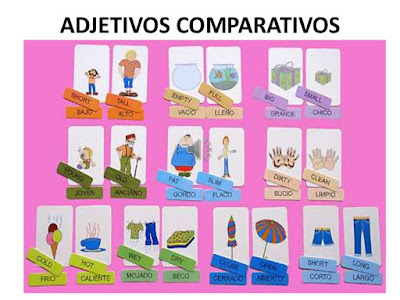en este segundo periodo empezamos con una conversación, un taller sobre los superlativos,comparativos, oraciones en ingles con los superlativos y los comparativos. Talleres, auxiliares Do, Does, Did.
juan: good afternoom! how are you?
karla: i am five thank you. and you parents?
juan: they are a little sick?
karla: and how old are they?
juan: my mother is fifty years old. and father is sixty- five years old.
karla: i am sorry, look at them.
juan: where do you live actually?
karla: we live next neighbor hood.
juan: oh! ok, then i will go to visit you.
karla: where were you on weekend.
Superlativo
| Positivo | Comparativo | Superlativo | Forma no estándar |
|---|---|---|---|
| -(a)blen 1 | - | ||
| acre, hacer | acérrimo | ||
| agudo | acutísimo | agudísimo | |
| alto | superior | supremo | altísimo |
| amigo | amigable | amicísimo | amiguísimo |
| antes | anterior | ||
| antiguo | antiquísimo | antigüísimo | |
| ardiente | ardentísimo | ||
| áspero | aspérrimo | asperísimo | |
| bajo | inferior | ínfimo | bajísimo |
| benéfico | beneficentísimo1 | ||
| bueno | mejor | óptimo/bonísimo | buenísimo |
| bello | bellísimo | ||
| célebre | celebérrimo | ||
| cierto | certísimo | ciertísimo | |
| cruel | crudelísimo | cruelísimo |
EJEMPLOS
- Cold, the coldest (frío, el más frío)
- Big, the biggest (grande, el más grande)
- Small, the smallest (pequeño, el más pequeño)
- Short, the shortest (corto, el más corto)
- Fast, the fastest (rápido, el más rápido)
- Young, the youngest (joven, el más joven)
- Soon, the soonest (pronto, lo más pronto)
- Long, the longest (largo, el más largo)
más + adjetivo + que (o, menos + adjetivo + que) es el comparativo de mayor uso.
Ejemplos:
|
auxiliares:
Do: auxiliar para hacer preguntas en tiempo presente, solo para primera persona en singular.
Does: auxiliar para oraciones en presente continuo (solo se us aen tercera persona she, it, he).
Did: auxiliar para formar oraciones en pasado (se usa con todos los pronombres).
ejemplo: I
You
He
She
It
We
They
You.
# she take the bus- presente (afirmative)
tercera persona.does she take the bus.
#we learnt the saturday.
did we learn the saturday.
# I have very money.
do i have very money?
# you eat mush candyes.
did you eat mush candies.
ejemplos:
1) She does read the newspaper every day. (Ella lee el periódico cada día)
We do come to school by bus. (Nosotros vamos a la escuela en autobús)
You do work very hard. (Tú trabajas muy duro)
She does like to sit in the sun. (A ella le gusta sentarse en el sol)
2) Did you watch Annabelle's movie in the cinema?
Viste la pelicula Annabelle en el Cine? -No,I didn't, because I don't like terror movies No, No lo hice, por que no me gustan las peliculas de terror.
3)


No hay comentarios.:
Publicar un comentario